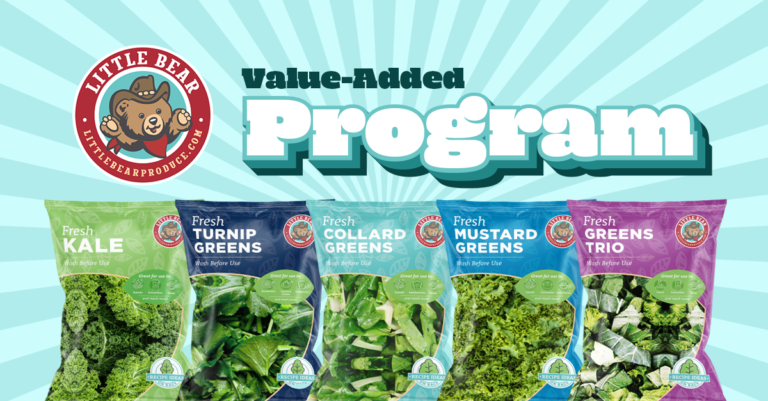“In late 2019, we noticed that the fresh cut trend was continuing to gain momentum and we thought we ought to move in that direction,” Bassetti said, noting that they did the legwork, laid the foundation and were ready to launch in early 2020. “Consumers were looking for more convenient options and it seemed like the next logical step for our list of commodities.”
That plan was quickly upset by the emergence of the coronavirus and the pandemic that ensued. The next two years were spent traversing the many challenges that COVID-19 brought with it, leaving little time to start a new product line.
“We ended up going live with our value-added products in February of 2022,” said Bassetti. “We’ve gone through the paces, but it’s been a great learning experience and we have experienced growth.”
He said it took a little time to find their rhythm but once they did sales took off and the product line has been expanded. In fact, in June of 2023, Little Bear Produce shut down its value-added facility for about five months to expand it to keep up with its business. “We went back live in November of 2023 with increased capacity and ready to further expand our line.”
The initial line included many bagged greens and kale, including collard greens, and a Fresh Greens Trio pack. The new expansion includes items such as bagged arugula and bagged spinach. Bassetti said the company’s approach is to move slowly into new items, establishing a niche and solving the “pain points” that its customers are experiencing.
“We see a lot of future opportunities, but we are treading lightly,” he said. “We are moving carefully and trying to repeat the success we have had on the fresh commodity side of the business.”
There are a lot of big players in the value-added, fresh-cut business and Little Bear Produce wants to pick and choose the areas in which it competes. “We feel that an attractive attribute that we offer that others don’t is that we are the farmers. We are not purchasing this product from others but growing it ourselves,” he said.
Bassetti said that allows for a reduction in lead time, a fresher product and longer shelf life. “We control the supply chain,” he offered.
The company also concentrates its sales of the fresh-cut product to Texas and nearby states. He noted that washing, cutting and bagging fresh produce does reduce its shelf life and the closer the proximity to your customer, the better it is for the consumer. Little Bear continues to expand that customer list and recently hired industry veteran Barrett Ortego, who was with California-based organicgirl, as its lead fresh cut salesperson.
When they first got into the fresh cut business, Bassetti said they were warned that the sales volume of greens would be quite significant during the holidays. “We were forewarned but the uptick in sales of collards and kale were still amazing. It did surprise us,” he said, reasoning that there is a lot of population diversity in the big cities of Texas with people who come from the South and grew up on southern cooking. “Our sales in November and December were truly remarkable, and they were buying in 1- and 2-pound packages, which is a lot of greens,” he said.
Looking down the road, Little Bear Produce wants to continue to expand its product line and find the next kale or collard that is ready to experience an explosion in sales growth. He said that’s the questions that everyone is focused on. “We don’t know what it’s going to be,” he said. “We just have to continue to focus on solving the problems of our customers and their consumers. The next big thing is going to vary depending on where your customers are. I think it will be tailored to specific areas.”
Little Bear Produce is also dipping its toes into the organic produce water as Bassetti said there is clearly growing demand.
He sees more and more retailers trying to carry just one line of unique, niche items such as rainbow chard. “It does seem to be the organic shopper who is drawn to these unique and other healthier options,” he observed.



